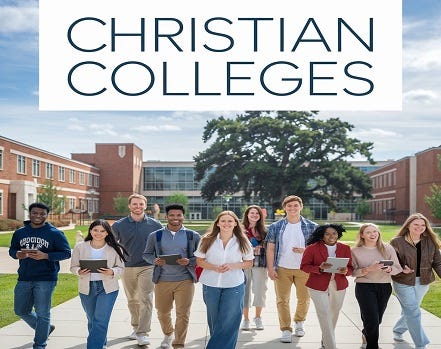Education Insider Magazine | Top Christian Colleges
 john campbell
john campbellIntroduction
In a rapidly evolving educational landscape, Christian colleges offer a unique blend of spiritual development and academic rigor. These institutions cater to students seeking a learning environment grounded in Christian values, providing an alternative to secular universities. But what sets them apart, and why are they gaining renewed interest in today’s world?
What Are Christian Colleges?
Christian colleges are institutions of higher learning that integrate Christian beliefs into their academic programs and campus life. While they offer a wide variety of degrees in fields such as business, science, the arts, and education, their distinguishing feature is a curriculum and community shaped by a biblical worldview.
Many of these colleges are affiliated with specific denominations (such as Baptist, Catholic, or Methodist), though others identify more broadly as interdenominational or evangelical. Examples include Wheaton College in Illinois, Liberty University in Virginia, and Biola University in California.
Faith in the Classroom and Beyond
At Christian colleges, students often attend chapel services, take courses in theology or religious studies, and participate in community service rooted in Christian principles. Professors are typically believers themselves and are encouraged to incorporate faith-based perspectives into their teaching.
This integration can be especially meaningful for students who want their spiritual growth to be as intentional as their academic progress. The atmosphere often encourages character formation, ethical leadership, and a sense of calling beyond just career preparation.
Academic Excellence with a Moral Compass
Contrary to some misconceptions, Christian colleges are not academically inferior. Many are nationally ranked and offer rigorous programs. What distinguishes them is how they approach knowledge — not as an end in itself, but as a means to glorify God and serve others.
The goal is to nurture students who are not only competent in their fields but also compassionate and morally grounded. This mission appeals to students and parents looking for education that aligns with their faith and values.

Challenges and Criticisms
Christian colleges do face challenges. Some critics argue that certain institutions may restrict academic freedom or enforce policies on gender, sexuality, or science that conflict with mainstream views. Others worry that students may not be exposed to a broad enough range of perspectives.
However, many Christian colleges strive to balance faithfulness with open inquiry. Accreditation standards require a commitment to academic integrity, and many campuses foster respectful dialogue between differing viewpoints.
Why Students Choose Christian Colleges
The decision to attend a Christian college often comes down to more than just academics. Students may be seeking:
A close-knit, values-based community
Opportunities for spiritual mentorship
A sense of purpose rooted in faith
Support for living out their beliefs in today’s world
For these students, Christian colleges offer not just a degree, but a foundation for lifelong growth — personally, professionally, and spiritually.
Conclusion
Christian colleges occupy a distinctive space in higher education, offering an environment where faith and learning are not at odds but in harmony. While not for everyone, they serve an important role for those who desire a Christ-centered academic experience. As society continues to ask big questions about purpose, identity, and truth, Christian colleges stand as institutions committed to providing answers grounded in faith and reason.
Subscribe to my newsletter
Read articles from john campbell directly inside your inbox. Subscribe to the newsletter, and don't miss out.
Written by

